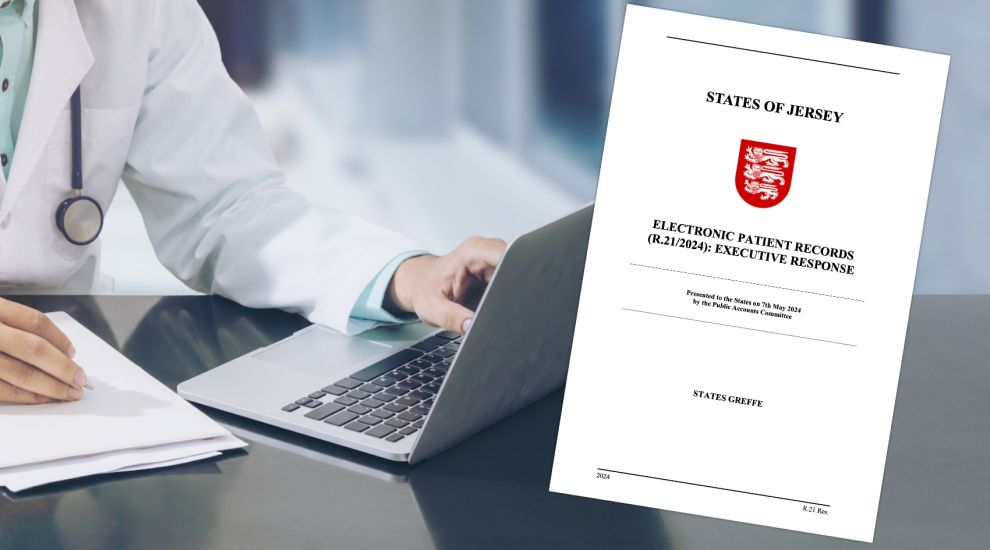


Concerns have been raised over the cost, "lengthy timeline" and "capability and capacity" of the team tasked with delivering improvements to a £30m project to help the hospital stop relying on paper records for patients.
The project to introduce an Electronic Patient Record (EPR) was first announced in 2021.
The EPR replaces paper records by bringing all clinical and administrative information involved in the care and management of patients into one place, with the aim of allow medics to access patients' information wherever and whenever they require it.
It went live last year, but requires improvements which will not be ready until March 2025 – and the panel of politicians responsible for scrutinising how effectively taxpayers' money is spent says it is concerned about how long those are taking to deliver, given the large spend on it.
It comes after a watchdog report revealed in February that there was no "transparent audit trail" for the EPR project and that it had been "hard to track" whether it had kept in budget.
In a new report, PAC said they were of the opinion that the March 2025 timeframe was "particularly long when considering the overall spend that is being committed by the Government of Jersey in the Information Technology space".

Pictured: The main aim of the Electronic Patient Record (EPR) system is to provide a single source of patient information for Jersey's Health Department.
The PAC also questioned whether the timescale is "appropriate in relation to clearly identifying the budget required for 2025".
The Government Plan 2025–2028, which outlines funding for the next three years, is set to to be lodged on 9 July 2024.
"As a result, the PAC would expect to see further information on the key milestones that Government intends to achieve in this time ahead of the implementation date of March 2025 and whether these can be brought forward at all for the first part of this action-mapping exercise," according to the report.

Pictured: A recent watchdog report found it "hard to track whether the EPR programme is over or under spending".
Published in February, the report by watchdog Comptroller and Auditor General Lynn Pamment also revealed that contractual negotiations for the £30m EPR system only took place after the procurement stage – meaning that "the final contract that was signed did not reflect the terms and conditions notified to potential bidders".
The C&AG report also found that difficulties in obtaining access to the ‘old’ patient information system for data migration meant that the implementation of the new system was delayed by seven months.
Reflecting on Ms Pamment's report, PAC raised concerns about the "capability and capacity" of the Government's Modernisation and Digital (M&D) team to implement improvements to the EPR system "alongside the myriad of other programmes" they are working on.
"This is noted especially in relation to the spend on consultants that has been attributed to projects within M&D’s remit," the panel said.

Pictured: The M&D department is responsible for developing and delivering the digital strategy for the Government, including how to use technologies to deliver efficient and effective public services.
The most recently published figures on the Government's consultant remuneration costs revealed that over £8.2m was spent on consultants for the ITS programme and £500k was spent on 'Digital Health' consultants between June and December 2022.
The PAC called for "further information about the constraints and risks for the project (as well as the overall M&D workplan) and a clearer understanding of the potential risk of non-implementation of recommendations that may not be achievable in current timeframes".
The committee also raised concerns that there does not appear to be "any mention" of how the end user – such as Health staff or members of the public – have been consulted in the development of the EPR project.
"The PAC would expect to see evidence of this when considering the benefits realisation of the project and will look at this further in its future planned review of procurement across the Government of Jersey," the report added.
The committee also outlined the importance of work in relation to benefits management of wide programmes being implemented "as a matter of priority".

Pictured: The Comptroller and Auditor General, Lynn Pamment has previously raised serious concerns about Government methods when it comes to recruiting advisers and suppliers.
The PAC noted that the EPR system was just one of many piece of work which "fall within the overall procurement space of the Government of Jersey".
The committee has therefore agreed to undertake a "deep dive review" into the overall procurement processes within Government, focussing on recommendations made by the C&AG.
It comes after Ms Pamment recently revealed that the Government spent over £881million on contracts that did not go through the proper procurement process over a three-and-a-half year period.
Comments
Comments on this story express the views of the commentator only, not Bailiwick Publishing. We are unable to guarantee the accuracy of any of those comments.